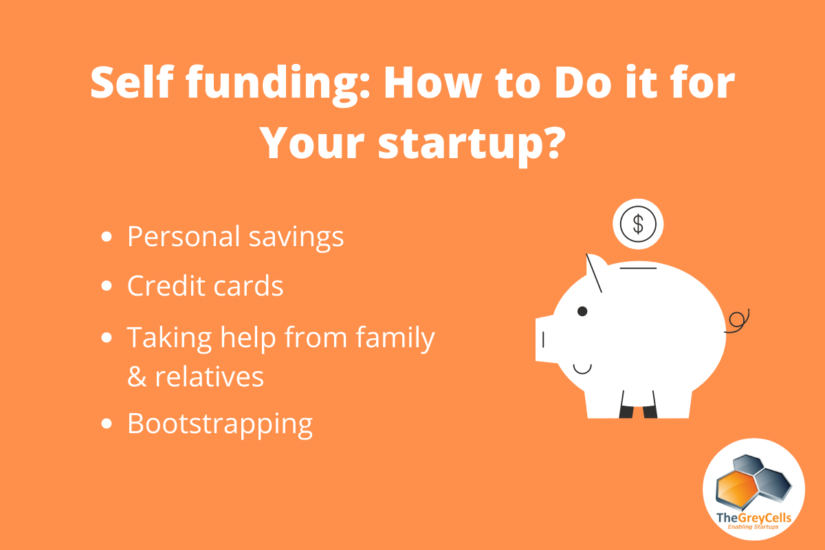Self-funding: How to Do it for Your startup?


Collecting funds for your startup is one of the foremost requirements in building a successful startup. There are several ways to collect funds for your startup, such as investors, angel investors, venture capitalists, government schemes, crowdfunding, etc. However, what suits best for your business is something that depends on your current situation, your business idea, your status, and past ventures.
To know which method exactly fits with your startup, a word with a business consultant will be highly useful.
But, in the majority of startups, self-funding is seen to be the most popular and accessible funding option. It is something that hits the minds of every founder in the beginning. But, what exactly is self-financing, and how to do it is often undiscussed or unplanned.
Therefore, we dedicated this article to startups with self-financing as their major funding option.
Self-funding or self-financing is when you manage all the required funds from your personal savings, loan or selling your other equity and invest your amount in a startup without any financial help from the outside, like investors, government, etc.
What are the Options in Self Funding?
Managing self-funding for your startup can be achieved in multiple ways. Some of the common is shared and discussed below:
1. Your Personal Savings
A good saving is a good investment amount. Your personal savings is a way to protect your business from financial risk and other insecurities of life.
Simply by cutting down your unnecessary expenditure, avoiding spending money on unwanted products, cooking at home instead of dining at restaurants quite often, limiting your credit card, and creating a budget for yourself can help you save a good amount in a short time.
With all these savings tips, you are likely to have enough funds for your startup.
These savings may not be enough for a business kick-start for big business ideas. However, small business ideas can be easily funded with these savings.
2. Bank Loans
Investment is paramount for startups. And a lot of founders opt for banks as their ultimate option for investment. Banks offer a lot of schemes for business ventures, and startups, in return for their ability to generate revenue in the future.
You need to fulfill certain criteria to be eligible for bank loans. Different banks have different criteria, and if you fulfill any of them, you are eligible to apply for them.
Banks give loans in return for some collateral. It can be your property, car, land, industry equipment, or cash from your savings accounts. If you fail to return the amount, the lender will seize the collateral and sell to extract the amount back.
3. Credit card
If you have a good credit score, using your credit card for funding your startup is an open option. However, it’s not at all a good way to fund your startup. Your inability to repay it would affect your credit score and may lead to card withdrawal.
However, in adverse situations of self-financing, credit cards are a useful, life-saving option.
4. Bootstrapping
Bootstrapping is another name for self-funding startups. In this, you start a company with the minimum financial and resources, with whatever you have without any help from the outside. The revenue you generate is re-invested in your firm to generate more revenue.
Bootstrapping is popular and a lot of successful companies of the world started as bootstrap companies. Simply start with whatever you have, and earn and get what’s more needed.
5. Spelling Assets
Another way of managing your self-funds is by selling your available personal assets or your assets of past ventures, or your equity from your other ventures.
For example, if you have land, a car, and other expensive things. Then selling it to collect funds would be a good option.
6. From Friends and Relatives
Borrowing funds for your startup from friends or relatives is another option available. It entirely depends on what kind of bonds you have with them, and what their financial status at present is.
It’s not often advised because it may risk your bonds, and disturb your personal life badly. However, if there is a chance, then it’s a better option because your collateral is not a risk, and borrowing is not based on any strict guidelines.
Benefit of Self-Funding
Self-financing; although not easy, has some great benefits, hence making it one of the popular funding options among young startups.
The best advantage of self-funding is; the founder holds the full equity and control over their startup. They have ultimate decision-making authority, and therefore any form of conflict is less likely to take place.
Further, managing funds by self builds a conscious mindset for expenditure. As a founder, you spend money e wisely which is a very useful trait for a company founder.
In the end, you have no debt risk; allowing you to have a slow but peaceful business journey in the beginning. As you generate traction and revenue, pitching for funds also becomes easier.
Disadvantages of Self-funding
Along with advantages, self-funding has several disadvantages as well.
The major disadvantage is, your personal finance is at risk: which equally risks your personal lifestyle.
If you fail, you end up with no money, lose your assets or property or credit. It also risks your relationship with whom you have borrowed money.
Also self financing is limited, which limits your action. You have calculated a budget for product development, marketing, and outsourcing, therefore the growth of your startup is much slower.

















Comments are closed.